- Home
- L. M. Montgomery
Anne of Avonlea
Anne of Avonlea Read online
Produced by An Anonymous Volunteer and David Widger
ANNE OF AVONLEA
by Lucy Maud Montgomery
To
my former teacherHATTIE GORDON SMITHin grateful remembrance of hersympathy and encouragement.
Flowers spring to blossom where she walks The careful ways of duty, Our hard, stiff lines of life with her Are flowing curves of beauty. --WHITTIER
I An Irate Neighbor II Selling in Haste and Repenting at Leisure III Mr. Harrison at Home IV Different Opinions47 V A Full-fledged Schoolma'am VI All Sorts and Conditions of Men . . . and women VII The Pointing of Duty VIII Marilla Adopts Twins IX A Question of Color X Davy in Search of a Sensation XI Facts and Fancies XII A Jonah Day XIII A Golden Picnic XIV A Danger Averted XV The Beginning of Vacation XVI The Substance of Things Hoped For XVII A Chapter of Accidents XVIII An Adventure on the Tory Road XIX Just a Happy Day XX The Way It Often Happens XXI Sweet Miss Lavendar XXII Odds and Ends XXIII Miss Lavendar's Romance XXIV A Prophet in His Own Country XXV An Avonlea Scandal XXVI Around the Bend XXVII An Afternoon at the Stone House XXVIII The Prince Comes Back to the Enchanted Palace XXIX Poetry and Prose XXX A Wedding at the Stone House
I
An Irate Neighbor
A tall, slim girl, "half-past sixteen," with serious gray eyes and hairwhich her friends called auburn, had sat down on the broad red sandstonedoorstep of a Prince Edward Island farmhouse one ripe afternoon inAugust, firmly resolved to construe so many lines of Virgil.
But an August afternoon, with blue hazes scarfing the harvest slopes,little winds whispering elfishly in the poplars, and a dancing slendorof red poppies outflaming against the dark coppice of young firs in acorner of the cherry orchard, was fitter for dreams than dead languages.The Virgil soon slipped unheeded to the ground, and Anne, her chinpropped on her clasped hands, and her eyes on the splendid mass offluffy clouds that were heaping up just over Mr. J. A. Harrison's houselike a great white mountain, was far away in a delicious world where acertain schoolteacher was doing a wonderful work, shaping the destiniesof future statesmen, and inspiring youthful minds and hearts with highand lofty ambitions.
To be sure, if you came down to harsh facts . . . which, it must beconfessed, Anne seldom did until she had to . . . it did not seem likelythat there was much promising material for celebrities in Avonleaschool; but you could never tell what might happen if a teacher usedher influence for good. Anne had certain rose-tinted ideals of what ateacher might accomplish if she only went the right way about it; andshe was in the midst of a delightful scene, forty years hence, with afamous personage . . . just exactly what he was to be famous for was leftin convenient haziness, but Anne thought it would be rather nice to havehim a college president or a Canadian premier . . . bowing low over herwrinkled hand and assuring her that it was she who had first kindled hisambition, and that all his success in life was due to the lessons shehad instilled so long ago in Avonlea school. This pleasant vision wasshattered by a most unpleasant interruption.
A demure little Jersey cow came scuttling down the lane and five secondslater Mr. Harrison arrived . . . if "arrived" be not too mild a term todescribe the manner of his irruption into the yard.
He bounced over the fence without waiting to open the gate, and angrilyconfronted astonished Anne, who had risen to her feet and stood lookingat him in some bewilderment. Mr. Harrison was their new righthandneighbor and she had never met him before, although she had seen himonce or twice.
In early April, before Anne had come home from Queen's, Mr. Robert Bell,whose farm adjoined the Cuthbert place on the west, had sold out andmoved to Charlottetown. His farm had been bought by a certain Mr. J. A.Harrison, whose name, and the fact that he was a New Brunswick man, wereall that was known about him. But before he had been a month in Avonleahe had won the reputation of being an odd person . . . "a crank," Mrs.Rachel Lynde said. Mrs. Rachel was an outspoken lady, as those of youwho may have already made her acquaintance will remember. Mr. Harrisonwas certainly different from other people . . . and that is the essentialcharacteristic of a crank, as everybody knows.
In the first place he kept house for himself and had publicly statedthat he wanted no fools of women around his diggings. FeminineAvonlea took its revenge by the gruesome tales it related about hishouse-keeping and cooking. He had hired little John Henry Carter ofWhite Sands and John Henry started the stories. For one thing, therewas never any stated time for meals in the Harrison establishment. Mr.Harrison "got a bite" when he felt hungry, and if John Henry were aroundat the time, he came in for a share, but if he were not, he had to waituntil Mr. Harrison's next hungry spell. John Henry mournfully averredthat he would have starved to death if it wasn't that he got home onSundays and got a good filling up, and that his mother always gave him abasket of "grub" to take back with him on Monday mornings.
As for washing dishes, Mr. Harrison never made any pretence of doing itunless a rainy Sunday came. Then he went to work and washed them all atonce in the rainwater hogshead, and left them to drain dry.
Again, Mr. Harrison was "close." When he was asked to subscribe to theRev. Mr. Allan's salary he said he'd wait and see how many dollars'worth of good he got out of his preaching first . . . he didn't believein buying a pig in a poke. And when Mrs. Lynde went to ask for acontribution to missions . . . and incidentally to see the inside ofthe house . . . he told her there were more heathens among the old womangossips in Avonlea than anywhere else he knew of, and he'd cheerfullycontribute to a mission for Christianizing them if she'd undertake it.Mrs. Rachel got herself away and said it was a mercy poor Mrs. RobertBell was safe in her grave, for it would have broken her heart to seethe state of her house in which she used to take so much pride.
"Why, she scrubbed the kitchen floor every second day," Mrs. Lynde toldMarilla Cuthbert indignantly, "and if you could see it now! I had tohold up my skirts as I walked across it."
Finally, Mr. Harrison kept a parrot called Ginger. Nobody in Avonlea hadever kept a parrot before; consequently that proceeding was consideredbarely respectable. And such a parrot! If you took John Henry Carter'sword for it, never was such an unholy bird. It swore terribly. Mrs.Carter would have taken John Henry away at once if she had been sureshe could get another place for him. Besides, Ginger had bitten a pieceright out of the back of John Henry's neck one day when he had stoopeddown too near the cage. Mrs. Carter showed everybody the mark when theluckless John Henry went home on Sundays.
All these things flashed through Anne's mind as Mr. Harrison stood,quite speechless with wrath apparently, before her. In his most amiablemood Mr. Harrison could not have been considered a handsome man; he wasshort and fat and bald; and now, with his round face purple with rageand his prominent blue eyes almost sticking out of his head, Annethought he was really the ugliest person she had ever seen.
All at once Mr. Harrison found his voice.
"I'm not going to put up with this," he spluttered, "not a day longer,do you hear, miss. Bless my soul, this is the third time, miss . . . thethird time! Patience has ceased to be a virtue, miss. I warned your auntthe last time not to let it occur again . . . and she's let it . . . she'sdone it . . . what does she mean by it, that is what I want to know. Thatis what I'm here about, miss."
"Will you explain what the trouble is?" asked Anne, in her mostdignified manner. She had been practicing it considerably of late tohave it in good working order when school began; but it had no apparenteffect on the irate J. A. Harrison.
"Tr
ouble, is it? Bless my soul, trouble enough, I should think. Thetrouble is, miss, that I found that Jersey cow of your aunt's in my oatsagain, not half an hour ago. The third time, mark you. I found her inlast Tuesday and I found her in yesterday. I came here and told youraunt not to let it occur again. She has let it occur again. Where's youraunt, miss? I just want to see her for a minute and give her a piece ofmy mind . . . a piece of J. A. Harrison's mind, miss."
"If you mean Miss Marilla Cuthbert, she is not my aunt, and she has gonedown to East Grafton to see a distant relative of hers who is very ill,"said Anne, with due increase of dignity at every word. "I am very sorrythat my cow should have broken into your oats . . . she is my cow and notMiss Cuthbert's . . . Matthew gave her to me three years ago when she wasa little calf and he bought her from Mr. Bell."
"Sorry, miss! Sorry isn't going to help matters any. You'd better go andlook at the havoc that animal has made in my oats . . . trampled them fromcenter to circumference, miss."
"I am very sorry," repeated Anne firmly, "but perhaps if you kept yourfences in better repair Dolly might not have broken in. It is your partof the line fence that separates your oatfield from our pasture and Inoticed the other day that it was not in very good condition."
"My fence is all right," snapped Mr. Harrison, angrier than ever at thiscarrying of the war into the enemy's country. "The jail fence couldn'tkeep a demon of a cow like that out. And I can tell you, you redheadedsnippet, that if the cow is yours, as you say, you'd be better employedin watching her out of other people's grain than in sitting roundreading yellow-covered novels," . . . with a scathing glance at theinnocent tan-colored Virgil by Anne's feet.
Something at that moment was red besides Anne's hair . . . which hadalways been a tender point with her.
"I'd rather have red hair than none at all, except a little fringe roundmy ears," she flashed.
The shot told, for Mr. Harrison was really very sensitive about his baldhead. His anger choked him up again and he could only glare speechlesslyat Anne, who recovered her temper and followed up her advantage.
"I can make allowance for you, Mr. Harrison, because I have animagination. I can easily imagine how very trying it must be to find acow in your oats and I shall not cherish any hard feelings against youfor the things you've said. I promise you that Dolly shall never breakinto your oats again. I give you my word of honor on THAT point."
"Well, mind you she doesn't," muttered Mr. Harrison in a somewhatsubdued tone; but he stamped off angrily enough and Anne heard himgrowling to himself until he was out of earshot.
Grievously disturbed in mind, Anne marched across the yard and shut thenaughty Jersey up in the milking pen.
"She can't possibly get out of that unless she tears the fence down,"she reflected. "She looks pretty quiet now. I daresay she has sickenedherself on those oats. I wish I'd sold her to Mr. Shearer when he wantedher last week, but I thought it was just as well to wait until we hadthe auction of the stock and let them all go together. I believe it istrue about Mr. Harrison being a crank. Certainly there's nothing of thekindred spirit about HIM."
Anne had always a weather eye open for kindred spirits.
Marilla Cuthbert was driving into the yard as Anne returned from thehouse, and the latter flew to get tea ready. They discussed the matterat the tea table.
"I'll be glad when the auction is over," said Marilla. "It is too muchresponsibility having so much stock about the place and nobody but thatunreliable Martin to look after them. He has never come back yet and hepromised that he would certainly be back last night if I'd give him theday off to go to his aunt's funeral. I don't know how many aunts he hasgot, I am sure. That's the fourth that's died since he hired here a yearago. I'll be more than thankful when the crop is in and Mr. Barry takesover the farm. We'll have to keep Dolly shut up in the pen till Martincomes, for she must be put in the back pasture and the fences there haveto be fixed. I declare, it is a world of trouble, as Rachel says. Here'spoor Mary Keith dying and what is to become of those two children ofhers is more than I know. She has a brother in British Columbia and shehas written to him about them, but she hasn't heard from him yet."
"What are the children like? How old are they?"
"Six past . . . they're twins."
"Oh, I've always been especially interested in twins ever since Mrs.Hammond had so many," said Anne eagerly. "Are they pretty?"
"Goodness, you couldn't tell . . . they were too dirty. Davy had beenout making mud pies and Dora went out to call him in. Davy pushed herheadfirst into the biggest pie and then, because she cried, he got intoit himself and wallowed in it to show her it was nothing to cry about.Mary said Dora was really a very good child but that Davy was full ofmischief. He has never had any bringing up you might say. His fatherdied when he was a baby and Mary has been sick almost ever since."
"I'm always sorry for children that have no bringing up," said Annesoberly. "You know _I_ hadn't any till you took me in hand. I hope theiruncle will look after them. Just what relation is Mrs. Keith to you?"
"Mary? None in the world. It was her husband . . . he was our thirdcousin. There's Mrs. Lynde coming through the yard. I thought she'd beup to hear about Mary."
"Don't tell her about Mr. Harrison and the cow," implored Anne.
Marilla promised; but the promise was quite unnecessary, for Mrs. Lyndewas no sooner fairly seated than she said,
"I saw Mr. Harrison chasing your Jersey out of his oats today when I wascoming home from Carmody. I thought he looked pretty mad. Did he makemuch of a rumpus?"
Anne and Marilla furtively exchanged amused smiles. Few things inAvonlea ever escaped Mrs. Lynde. It was only that morning Anne had said,
"If you went to your own room at midnight, locked the door, pulled downthe blind, and SNEEZED, Mrs. Lynde would ask you the next day how yourcold was!"
"I believe he did," admitted Marilla. "I was away. He gave Anne a pieceof his mind."
"I think he is a very disagreeable man," said Anne, with a resentfultoss of her ruddy head.
"You never said a truer word," said Mrs. Rachel solemnly. "I knewthere'd be trouble when Robert Bell sold his place to a New Brunswickman, that's what. I don't know what Avonlea is coming to, with so manystrange people rushing into it. It'll soon not be safe to go to sleep inour beds."
"Why, what other strangers are coming in?" asked Marilla.
"Haven't you heard? Well, there's a family of Donnells, for one thing.They've rented Peter Sloane's old house. Peter has hired the man to runhis mill. They belong down east and nobody knows anything about them.Then that shiftless Timothy Cotton family are going to move up fromWhite Sands and they'll simply be a burden on the public. He isin consumption . . . when he isn't stealing . . . and his wife is aslack-twisted creature that can't turn her hand to a thing. She washesher dishes SITTING DOWN. Mrs. George Pye has taken her husband's orphannephew, Anthony Pye. He'll be going to school to you, Anne, so you mayexpect trouble, that's what. And you'll have another strange pupil, too.Paul Irving is coming from the States to live with his grandmother.You remember his father, Marilla . . . Stephen Irving, him that jiltedLavendar Lewis over at Grafton?"
"I don't think he jilted her. There was a quarrel . . . I suppose therewas blame on both sides."
"Well, anyway, he didn't marry her, and she's been as queer as possibleever since, they say . . . living all by herself in that little stonehouse she calls Echo Lodge. Stephen went off to the States and wentinto business with his uncle and married a Yankee. He's never been homesince, though his mother has been up to see him once or twice. His wifedied two years ago and he's sending the boy home to his mother for aspell. He's ten years old and I don't know if he'll be a very desirablepupil. You can never tell about those Yankees."
Mrs Lynde looked upon all people who had the misfortune to be bornor brought up elsewhere than in Prince Edward Island with a decidedcan-any-good-thing-come-out-of-Nazareth air. They MIGHT be good people,of course; but you were on the safe side in doubting it. She
had aspecial prejudice against "Yankees." Her husband had been cheated outof ten dollars by an employer for whom he had once worked in Boston andneither angels nor principalities nor powers could have convinced Mrs.Rachel that the whole United States was not responsible for it.
"Avonlea school won't be the worse for a little new blood," said Marilladrily, "and if this boy is anything like his father he'll be all right.Steve Irving was the nicest boy that was ever raised in these parts,though some people did call him proud. I should think Mrs. Irving wouldbe very glad to have the child. She has been very lonesome since herhusband died."
"Oh, the boy may be well enough, but he'll be different from Avonleachildren," said Mrs. Rachel, as if that clinched the matter. Mrs.Rachel's opinions concerning any person, place, or thing, were alwayswarranted to wear. "What's this I hear about your going to start up aVillage Improvement Society, Anne?"
"I was just talking it over with some of the girls and boys at the lastDebating Club," said Anne, flushing. "They thought it would be rathernice . . . and so do Mr. and Mrs. Allan. Lots of villages have them now."
"Well, you'll get into no end of hot water if you do. Better leave italone, Anne, that's what. People don't like being improved."
"Oh, we are not going to try to improve the PEOPLE. It is Avonleaitself. There are lots of things which might be done to make itprettier. For instance, if we could coax Mr. Levi Boulter to pulldown that dreadful old house on his upper farm wouldn't that be animprovement?"
"It certainly would," admitted Mrs. Rachel. "That old ruin has been aneyesore to the settlement for years. But if you Improvers can coaxLevi Boulter to do anything for the public that he isn't to be paid fordoing, may I be there to see and hear the process, that's what. I don'twant to discourage you, Anne, for there may be something in your idea,though I suppose you did get it out of some rubbishy Yankee magazine;but you'll have your hands full with your school and I advise you as afriend not to bother with your improvements, that's what. But there,I know you'll go ahead with it if you've set your mind on it. You werealways one to carry a thing through somehow."
Something about the firm outlines of Anne's lips told that Mrs. Rachelwas not far astray in this estimate. Anne's heart was bent on formingthe Improvement Society. Gilbert Blythe, who was to teach in WhiteSands but would always be home from Friday night to Monday morning, wasenthusiastic about it; and most of the other folks were willing to go infor anything that meant occasional meetings and consequently some "fun."As for what the "improvements" were to be, nobody had any very clearidea except Anne and Gilbert. They had talked them over and planned themout until an ideal Avonlea existed in their minds, if nowhere else.
Mrs. Rachel had still another item of news.
"They've given the Carmody school to a Priscilla Grant. Didn't you go toQueen's with a girl of that name, Anne?"
"Yes, indeed. Priscilla to teach at Carmody! How perfectly lovely!"exclaimed Anne, her gray eyes lighting up until they looked like eveningstars, causing Mrs. Lynde to wonder anew if she would ever get itsettled to her satisfaction whether Anne Shirley were really a prettygirl or not.

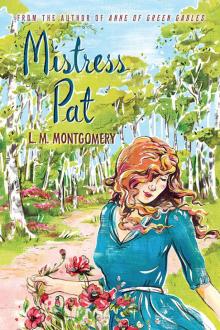 Mistress Pat
Mistress Pat A Tangled Web
A Tangled Web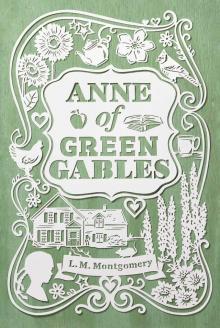 Anne of Green Gables
Anne of Green Gables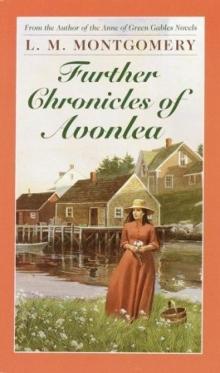 Further Chronicles of Avonlea
Further Chronicles of Avonlea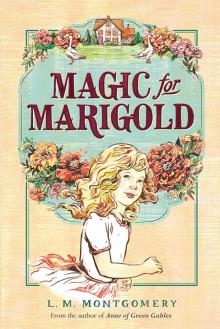 Magic for Marigold
Magic for Marigold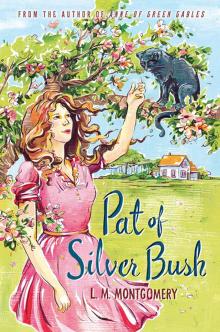 Pat of Silver Bush
Pat of Silver Bush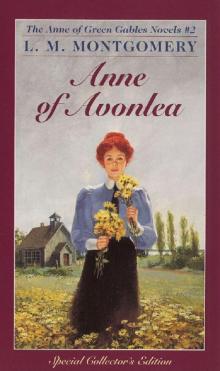 Anne of Avonlea
Anne of Avonlea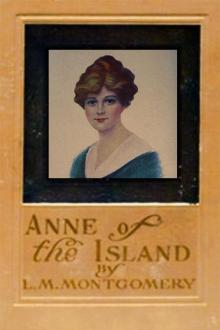 Anne of the Island
Anne of the Island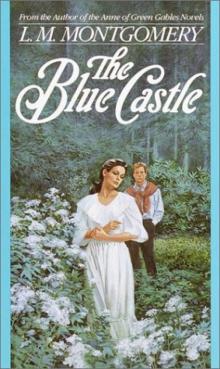 The Blue Castle
The Blue Castle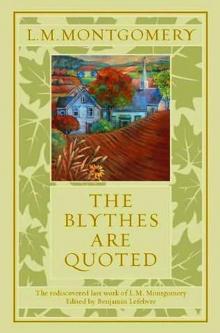 The Blythes Are Quoted
The Blythes Are Quoted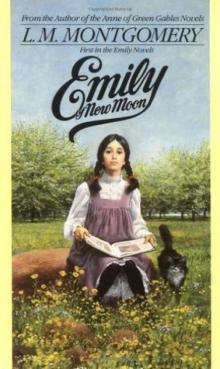 Emily of New Moon
Emily of New Moon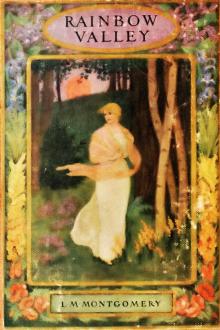 Rainbow Valley
Rainbow Valley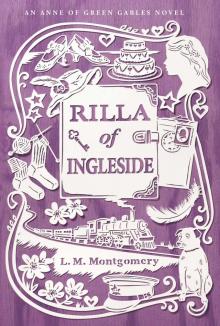 Rilla of Ingleside
Rilla of Ingleside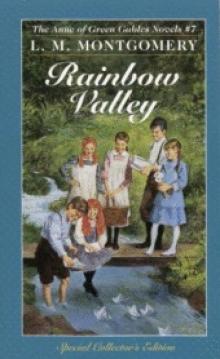 07 - Rainbow Valley
07 - Rainbow Valley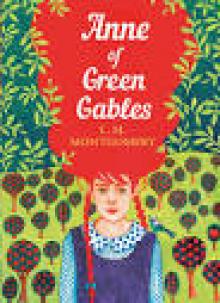 Anne of Green Gables (Penguin)
Anne of Green Gables (Penguin)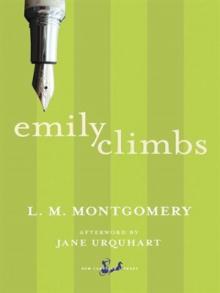 Emily Climbs
Emily Climbs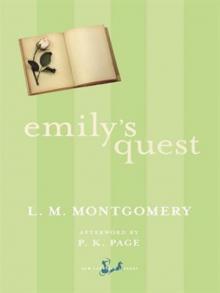 Emily's Quest
Emily's Quest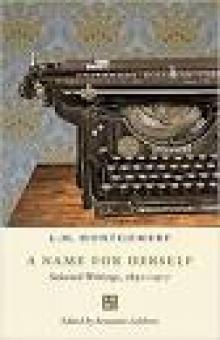 A Name for Herself
A Name for Herself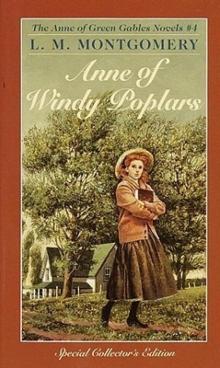 Anne of Windy Poplars
Anne of Windy Poplars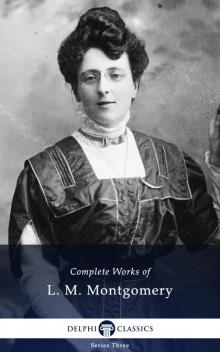 The Complete Works of L M Montgomery
The Complete Works of L M Montgomery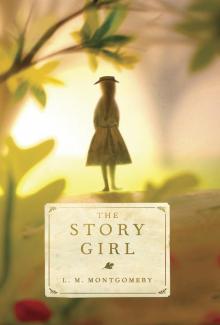 The Story Girl
The Story Girl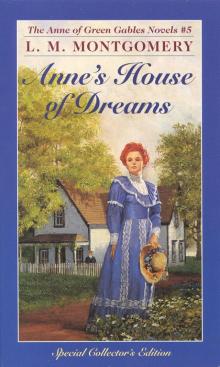 Anne's House of Dreams
Anne's House of Dreams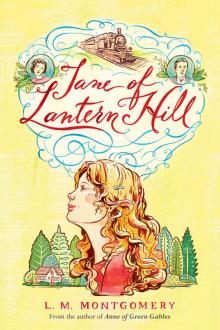 Jane of Lantern Hill
Jane of Lantern Hill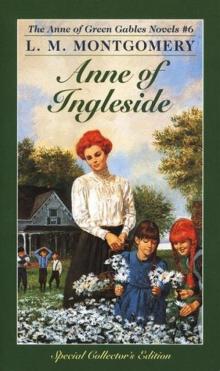 Anne of Ingleside
Anne of Ingleside